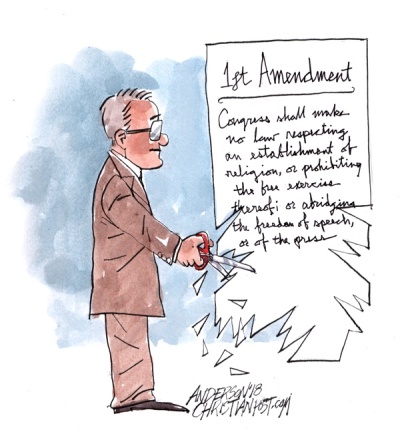Why the US needs to stop eroding its freedom

Over the past decade, the U.S. Department of State has spent millions of dollars expanding digital technology to promote free expression, democratic elections, and reduce the threat of online Islamic radicalization. I served as a subject matter expert on several of those programs, providing quality control and oversight on whether the programs were achieving their intended outcomes. It was a dangerous field, with trips often delayed by terror threats and other unforeseen travel hazards.
On one of the projects expanding the use of internet technology in Iran, based in Lebanon, my colleague was imprisoned and charged with espionage. Contractors, aid workers, and diplomats alike accepted the risks because we believed in the inherent value of free speech to defeat tyranny and promote democratic values.
Remember all the color revolutions that swept throughout the Middle East and North Africa? There were large-scale demonstrations on the streets, with demands for free elections or regime change and calls for removing authoritarian leaders. Many of those would not be possible without the technical support of the U.S. and other Western countries. They gave everyday citizens the ability and know-how to propagate information online that mobilized thousands of supporters. The dissemination of ideas about government corruption, abuse of political dissidents, and the innate human desire for freedom ultimately prevailed in many of those nations. Their triumphs were a victory for democratic ideals, regardless of ethnicity or religion.
However, the standing of the U.S. and its allies as the beacons of freedom is eroding. The obsession with combatting "disinformation" and the lack of respect for differing political opinions is having a dangerous ripple effect on other regimes seeking to consolidate power. Taking a cue from our rhetoric, countries like Tunisia, Turkey, and Russia, have sought to criminalize "disinformation" to silence journalists and their political opponents.
In Turkey, their new disinformation bill censors online information content and criminalizes journalism deemed false or misleading. It empowers the government to further subdue and control public debate in the lead-up to Turkey's general elections in 2023. It is considered one of the heaviest censorship mechanisms in the history of the Republic.
In Tunisia, the law imposes harsh criminal penalties for the intentional distribution of information that appears to "promote, publish, transmit or prepare false news, statements, rumors or documents that are artificial …"
Less surprising is the recent Russia amendment to its 2019 disinformation law that imposes up to 15 years in prison for anyone publishing information about the Russian armed forces that is deemed "false."
Even the European Union, which advised against criminalizing disinformation as recently as 2017, has now proposed a new framework that imposes sanctions and freezes the assets of those who "spread information intended to manipulate or mislead."
In the West, the whole idea of banning bad ideas or even outlandish conspiracy theories has never been grounds for criminal prosecution. However, since the 2016 presidential campaign and the Russian spread of propaganda to influence our elections, this idea of criminalizing speech has gained momentum. The United States has long been the master of information wars in our struggles to defeat communism. We fought destructive ideas with better ones focused on freedom and the right to self-determination. U.S. national security also includes intelligence operations that prevent foreign government attempts to undermine our way of life. But that's a far cry from arresting fellow Americans because their ideas against vaccinations are too dangerous or their political views are controversial.
Public statements by White House officials and interviews in mainstream media hammer home this Administration's focus on stopping any speech it doesn't agree with. Reporters now describe our constitutional protection of speech as a "challenge" to overcome rather than the cherished freedom we promote worldwide.
Thankfully, the First Amendment remains a bulwark against overt attempts to criminalize unpopular speech here in the U.S. However, several whistleblowers claim the FBI "has been manipulating case-file management to falsely inflate the threat of domestic terrorism and using unconstitutional excessive force against political dissenters." This is an alarming accusation and severely undermines public confidence in how law enforcement is being used to silence political opposition.
Though on its face, one can find justification for preventing the widespread use of false information, the obvious question becomes who defines what is false. The FBI accusations illustrate how opinions can be weaponized and have serious consequences. Some experts suggest solutions such as reinvigorating civics education in schools and through public information campaigns to restore trust in our voting process, the judiciary, and law enforcement. Such programs would have the dual benefit of educating our populace and increasing transparency in our systems of government.
Ultimately, as Americans, we cannot stop leading by example. Our laws and policies should demonstrate that we trust the free marketplace of ideas. Otherwise, the U.S. government's paranoia and overreach to stop the free flow of information will be why other nations oppress, harass, and curtail the freedoms we fought so hard to promote.
Hedieh Mirahmadi was a devout Muslim for two decades working in the field of national security before she experienced the redemptive power of Jesus Christ and has a new passion for sharing the Gospel. She dedicates herself full-time to Resurrect Ministry, an online resource that harnesses the power of the Internet to make salvation through Christ available to people of all nations, and her daily podcast LivingFearlessDevotional.com.





















